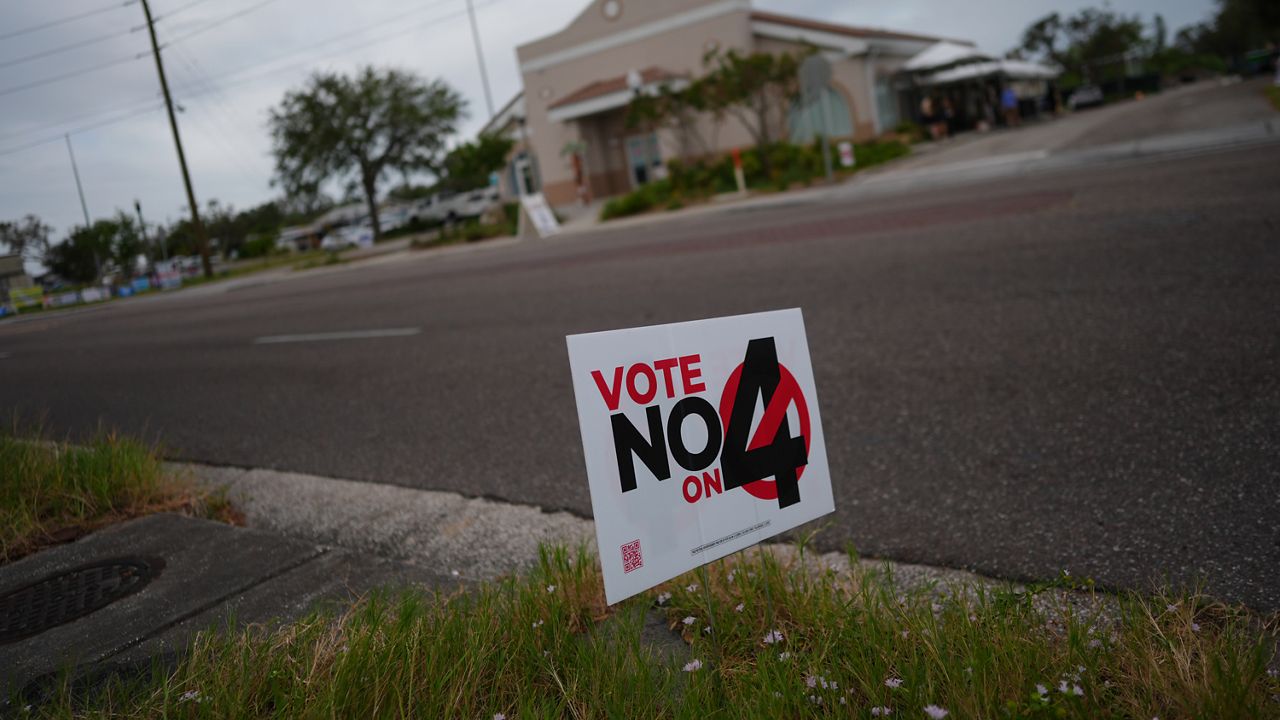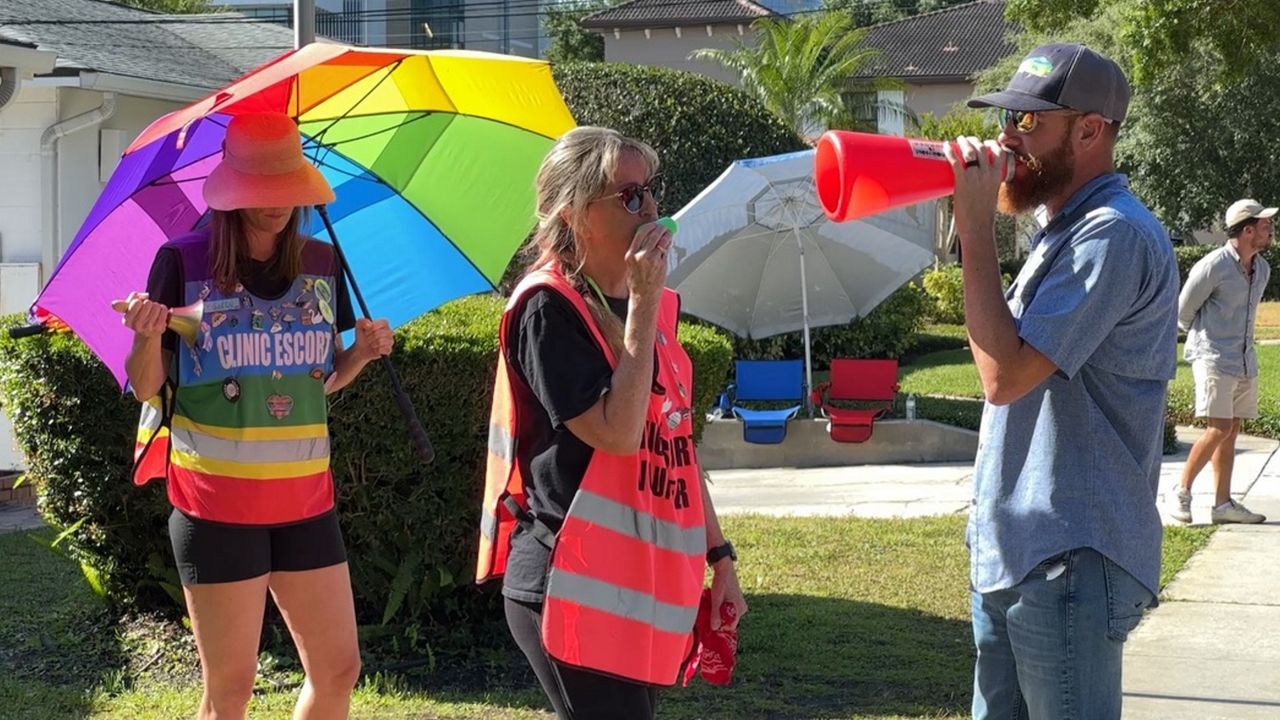TALLAHASSEE, Fla. — Just minutes after Leon County Circuit Court Judge John Cooper granted a temporary injunction to block Florida’s new 15-week abortion ban from going into effect, the decision was undone by an appeal from the state.
If the new law had remained blocked, Florida's abortion restrictions would have reverted to the post-24-week ban that was already in effect. But because the temporary injunction was automatically stayed by the state's appeal, the new law is now in effect.
In his ruling, Judge Cooper wrote that that the plaintiffs in the case, which include the ACLU of Florida and Planned Parenthood, “have a likelihood to succeed on the claim that the law violates the right to privacy contained in the Florida Constitution.”
What You Need To Know
- Leon County Circuit Court Judge John Cooper filed an order Tuesday, blocking Florida's 15-week abortion ban from going into effect
- The injunction was blocked minutes later by an automatic stay that was issued when the state appealed the decision
- With the stay in place, Florida's new 15-abortion ban has gone into effect
Because the U.S. Supreme Court overturned Roe v. Wade on June 24, it is now up to states to determine their own abortion laws.
Over the weekend, people advocated on both sides of the debate. Some were fearful of losing rights, while others want further restrictions on abortion access.
“We will settle for nothing less than the unborn being declared persons, that they have the rights restored, the same rights that you and I have," said one local Central Florida protester.
Attorneys for the groups challenging the 15-week ban applauded Judge Cooper’s ruling on Tuesday.
“We made a strong case. It’s based on decades of binding Florida Supreme Court precedents, and the judge ruled in concordance with that precedent,” said Daniel Tilley, attorney with the ACLU of Florida.
Planned Parenthood Federation of America and the Center for Reproductive Rights are also plaintiffs in the case.
John Stemberger disagrees.
The head of the Orlando-based Family Policy Council and a leading anti-abortion advocate says that the 1980 constitutional amendment was part of the post-Watergate era where Americans had major concerns about privacy.
“The language is broad, but it does not encompass abortion,” he says. “We believe that the (Florida Supreme Court) will strike down the bad precedent of In re T.W. and will find that there really is no fundamental right to privacy that leads to abortion that the people put into the Constitution.”
“Whether that’s who we can marry, whether that’s if we can have children, how many children or whether to decide to have a family at all, these are all personal decisions that should be made by the individual,” said Equality Florida Deputy Field Director Yordanos Molla.
In the Tallahassee case — Planned Parenthood of Southwest and Central Florida v. State of Florida — abortion clinics and doctors are challenging the state law, arguing that it violates the right to privacy afforded by the state constitution.
According to data from the Florida Agency for Health Care Administration, 79,817 abortions were performed in the state during the past year. The data shows the vast majority of those, about 94%, happened in the first trimester through week 11.
Further, the numbers point to 119 total abortions due to “life-dangering physical conditions,” 118 due to rape, and eight due to incest.
Some lawmakers, like State Rep. Anthony Sabatini (R- District 32), are pushing for a special session for the legislature to pass a more stringent abortion law, like some other states have done.
“We must pass the Heartbeat Bill & other strong pro-life measures to protect Florida’s unborn children,” he wrote on Twitter.
Today I sent a letter to @GovRonDeSantis & other legislative leaders calling for an emergency legislative session to pass stronger pro-life Legislation in Florida
— Rep. Anthony Sabatini (@AnthonySabatini) June 24, 2022
We must pass the Heartbeat Bill & other strong pro-life measures to protect Florida’s unborn children#lifewins pic.twitter.com/4w4x7IkwUJ
Other abortion-rights advocates like State Rep. Anna Eskamani (D- District 47) said, “I find it ironic that despite the fact that Gov. DeSantis wants to run for president in 2024 and has continued to carry anti-abortion tropes throughout his rhetoric and policy agenda, that his statement stops short of saying he would call for a special session to ban abortion or that he would fully support an abortion ban.”
Injunction Order
In his order implementing the quickly overturned temporary injunction to block Florida's 15-week abortion ban, Cooper noted the 1980 amendment to the state's Constitution that expressly grants citizens a right to privacy.
"The Florida Supreme Court thereafter determined that this right to privacy is 'clearly implicated in a woman's decision of whether or not to continue her pregnancy,'" Cooper wrote.
He noted that the recent ruling in Dobbs v. Jackson Women's Health Organization — which overturned the 50-year-old precedent established in Roe v. Wade and gave states the sole ability to regulate abortion — does not apply in the Florida case.
"The right to privacy under the Florida Constitution is 'much broader in scope' than any privacy right under the United States Constitution," Cooper wrote.
In addressing some of the expert witnesses that testified in the case, the judge spent numerous pages going over points made by Dr. Shelly Hsiao-Ying Tien, who spoke on the causes, need and safety of abortion after 15 weeks on behalf of the plaintiffs seeking the injunction.
Tien is listed in the order as providing "abortion care and other services at the Jacksonville clinic of Planned Parenthood or South, East and North Florida."
"The Court finds that Dr. Tien's testimony as to the safety of abortion, including when performed after 15 weeks, based on her training and extensive clinical experience ... is persuasive," Cooper wrote in his order. "In addition, and separately, the literature that Dr. Tien relied upon in formulating her opinions is credible, robust, supports her opinions, and is widely accepted in the scientific community.
"The Court therefore accords significant weight to Dr. Tien's testimony."
Cooper was less enthusiastic about the state's expert witness, Dr. Ingrid Skop, an OB/GYN with 30 years experience who is currently a salaried senior fellow at the Charlotte Lozier Institute.
"Dr. Skop testified that, based on her experience, she has 'not found any medical reasons that women must have' an abortion, and that she thinks abortion 'is used for social indications," the judge wrote in his order. "She disputes scientific findings that abortion is safer than childbirth based on her belief that the data is 'compromised.'"
Saying they have a "'pro choice' bias," Skop told Cooper, according to his filing, that her views on abortion safety are "inconsistent with the findings of [a] number of medical associations."
Cooper noted that those organizations include: the American College of Obstetricians and Gynecologists; the American Psychological Association; the National Academies of Sciences, Engineering, and Medicine; the American Medical Association; and the Centers for Disease Control and Prevention.
Under questioning about a 20-year-old study Skop was citing in her testimony about the safety of abortions in the second trimester, the doctor "could not point to any current data to support the conclusion that (dilation and evacuation) abortions are not safe."
Similarly, Cooper wrote that he found Skop's testimony on abortion mortality unpersuasive, noting her belief that "all existing data on abortion mortality in the U.S. are inaccurate, due to pressure on abortion providers to undercount mortality."
The judge was blunt in his assessment of Skop's testimony in general.
"Further, the Court found Dr. Skop's testimony to be unsupported, such as when she asserted that she had 'no doubt' that abortion can create complications in future pregnancies yet also said that 'at this time we don't have the ability to detect those complications to prove that that is happening,'" Cooper wrote.
He later summed up his opinion of Skop as an expert witness for the state:
"Overall, Dr. Skop has no experience in performing abortions; admitted that her testimony on the risks of certain abortion complications was inaccurate and overstated, or based on data from decades ago; admitted that her view on abortion safety are out of step with mainstream medical organizations; and provided no credible scientific basis for her disagreement with recognized high-level medical organizations in the United States. The Court thus does not find Dr. Skop as credible on the risks of abortion complications and quality of abortion care as Dr. Tien, who has significant experience in performing abortions and the other qualifications set forth above."
Fetal Pain Determination
The order also discussed testimony on mental health and fetal pain, and Cooper noted that he was not persuaded by the state's arguments in either category.
He pointed out that the state's expert witness on fetal pain — Dr. Maureen Condic, an associate professor of neurobiology and anatomy at the University of Utah — identifies herself as "an 'animal biologist' who 'does not work on humans.'"
Tien was again the plaintiff's expert witness in the field, and Cooper lifted up her experience and credentials in the case.
"... the Court accepts Dr. Tien's testimony as credible and persuasive based on her experience as (a maternal-fetal medicine) specialist, including her firsthand knowledge of fetal surgery and intrauterine fetal procedures," Cooper wrote. "In contrast, the Court gives no weight to Dr. Condic's opinions because Dr. Condic has no clinical experience with humans and conceded that her estimation of when fetal pain perception occurs differs from the 'generally [accepted]' view among mainstream medical organizations."
Based on the testimony he heard, Cooper determined that "due to the lack of the necessary pathways, the earliest point at which a fetus could have the necessary components — or building blocks — to feel pain is 24-26 weeks ... The Court finds that an asserted interest in preventing fetal pain is not supported by the most persuasive evidence in this case and thus does not support HB 5's ban on abortion after 15 weeks LMP (last menstrual period)."
Ultimately, Cooper found that "Plaintiffs have a substantial likelihood of success on the merits of their claim that HB 5 violates the right to privacy contained in the Florida Constitution" and rejected the state's assertion that the law "is not a ban but a regulation that encourages women to seek abortions earlier."
"Thus, HB 5's ban on abortion prior to viability likely violates the right to privacy under the Florida Constitution because it implicates that right and likely cannot survive strict scrutiny," Cooper wrote before concluding that "a temporary injunction of HB 5 will serve the public interest."
Florida Abortion Injuction by Dale Greenstein on Scribd
Mark Boxley - Digital Media Producer
Mark is a longtime newspaper reporter who started his career at a small outlet in Bardstown, Ky., after graduating from the University of Kentucky with a BS in journalism. He is a former Kiplinger Fellow at Ohio State University and has worked as a journalist in Wisconsin, Kentucky, Tennessee, Ohio, and Florida. Mark became a digital media producer with Spectrum News in 2020.









